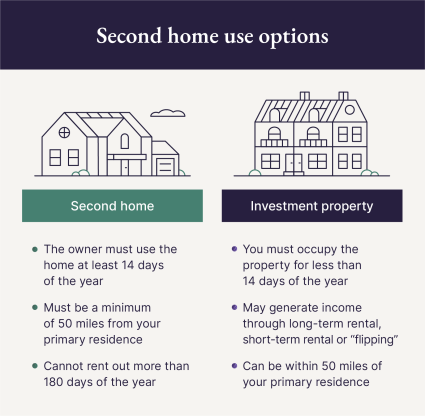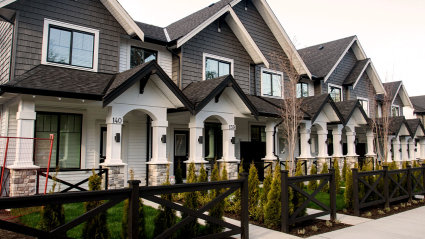What is a second home?
A second home is a dwelling you own in addition to your primary residence. A vacation home is a type of second home that owners use for leisure throughout the year but do not reside there permanently. Here are a few defining factors of a second home:- The owner must use the home at least 14 days of the year.
- Cannot rent out more than 180 days of the year.
- Must be a minimum of 50 miles from your primary residence.

What is an investment property?
An investment property is an asset you buy with the intention of generating income through rent or value appreciation. A short-term rental is an example of an investment property with the primary objective of generating rental income. Here are the defining factors of an investment property:- You must occupy the property for less than 14 days of the year.
- You may generate income through long-term rental, short-term rental or “flipping.”
- The home must be within 50 miles of your primary residence.
7 second home vs investment property financing differences
When it comes to financing, investment property and second home requirements can differ greatly. Here’s an overview of how each ownership type affects your several financing factors| Second home | Investment properties | |
| Mortgage rates | Higher than primary home | Higher than second home |
| Down payments | Minimum of 10% | Between 15% to 25% |
| Debt-to-income ratio | 45% with a 620 to 680 credit score | 45% with a 700 or higher credit score |
| Closing costs | About the same as a primary home | Higher than second home |
| Income reporting | Income potential won’t factor into financing | Lenders may consider profit potential |
| Number of units | One mortgage per property | Multifamily unit financing available |
| Cash reserves | Minimum of two months | Minimum of six months |
1. Mortgage interest rates
Even with the same amount of money down and the same home loan length, a mortgage for an investment property will almost always carry a higher mortgage interest rate than a loan for a second home.2. Down payments
According to the Fannie Mae Eligibility Matrix, a second home loan will require a minimum down payment of 10%. In comparison, an investment property minimum down payment starts at 15% and can be as high as 25%. Like a mortgage for a primary home, the higher your credit score, the less money you’ll need for a down payment.3. Debt-to-income (DTI) ratio
According to Bankrate, the minimum credit score range lenders will consider for a second home purchase is between 620 and 680. For investment properties, on the other hand, lenders may require a score of 700 or better to qualify for investment property mortgage financing. You should also aim for a DTI of 45% or less to increase your chances of securing an investment property or a second home mortgage.4. Closing costs
Lenders often charge higher origination fees (or closing costs) for investment properties than for second homes.5. Income reporting
Because an investment property can earn you additional income through rental or resale, mortgage lenders will often include potential future profits when calculating your DTI for a rental property. You won’t have that perk with second home financing.6. Number of units
For a second home, you are only allowed a mortgage on a single-unit property. For an investment property or rental property, you can get a mortgage on a property of up to four units.7. Cash reserves
A mortgage for a second home will require you to have a minimum of two months of cash reserves on hand. For an investment property, you will need a minimum of six months’ cash reserves.Tax considerations
Aside from having a firm grasp on investment property and second home mortgage rules, it’s important to understand the tax implications of both options. It’s also smart to consult with your tax adviser. Let’s break down the tax considerations.1. Mortgage interest
While mortgage interest on a second home is often deductible for personal use, it can also be claimed as a business expense for an investment property, potentially providing tax benefits based on the property's purpose. Here is how second home and investment property mortgage rates differ:- Second home: Deductible on up to $750,000 of mortgage debt or $375,000 if married but filing separately.
- Investment property: You can deduct mortgage interest as a business expense when you use your investment property more than 14 days a year.
2. Property taxes
You can potentially deduct the property taxes of your second home, especially if it’s the first home you buy. However, investment property taxes are almost always deductible as a qualifying business expense.- Second home: You can potentially deduct $10,000 worth of total property taxes on your tax return or $5,000 if you’re married and filing separately.
- Investment property: Your property taxes can potentially qualify as a deductible business expense.
3. Rental income
Income you earn from your vacation rental can potentially be deductible, and second homes that you occasionally rent out may also qualify for this perk.- Second home: If you rent your second home fewer than 14 days a year, you don’t need to report rental income on your tax return.
- Investment property: Although you do have to pay taxes on the rental income of your investment property, you can also deduct relevant business expenses like repair costs.
4. Home equity loan interest
Interest on a home equity loan for a second home may be deductible. In contrast, interest on a home equity loan for an investment property is generally deductible as a business expense.- Second home: If there is a mortgage on your second home and you haven't borrowed against the equity of your first home, you can deduct the interest on a home equity loan.
- Investment property: Investment properties also qualify for this deduction. You will, however, be responsible for paying capital gains tax when selling the investment property.
Second home vs investment property FAQ
01: Can you claim an investment property as a second home?
No, you cannot typically claim an investment property as a second home. A second home is usually a property used for personal enjoyment. In contrast, buyers acquire an investment property with the primary goal of generating income or appreciation. Tax implications and eligibility for deductions differ between the two.
02: Can you turn a second home into an investment property?
Yes, you can turn a second home into an investment property by renting it out to generate income. Converting a second home into an investment property may have tax implications, and it's essential to consider local regulations and tax laws related to rental properties.
03: Is it better to have a second home or investment property?
Choosing between a second home and an investment property depends on individual financial goals and lifestyle preferences. A second home provides personal enjoyment, while an investment property is for generating income.
04: How can I get the best rates and terms for my second home or investment property mortgage?
You’ll find that mortgage rates and terms vary from lender to lender. It’s important to shop around and talk to several lenders to find the best deal on a mortgage for your second home or investment property.









